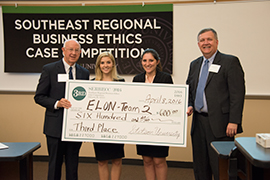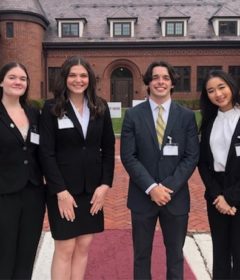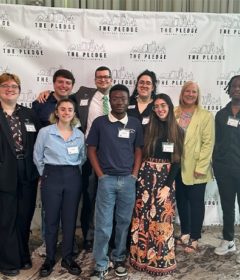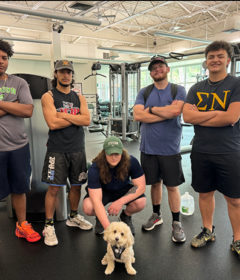14 Teams Meet in Business Ethics Competition

![EthicsCompetition_290[1]](https://www2.stetson.edu/today/wp-content/uploads/2016/04/EthicsCompetition_2901.jpg)
In the weeks before the competition, students crafted presentations as if they were consultants advising Publix on what action to take. The teams, each composed of two students, gave their presentations during a bracketed, three-round competition held in Rinker Auditorium at the Lynn Business Center.
A University of Florida team composed of senior finance major Connor Lowther and junior accounting major Alex Maller took first place and the $1,000 top prize. Teams from Elon University finished second and third, earning $800 and $600 awards, and a team from Wake Forest University took fourth, earning a $400 prize. The competition was judged by a 16-member panel composed of Florida business leaders and educators.
As the host institution, Stetson students were ineligible to compete but assisted with staging the competition.
“In business, as in many other areas of our lives, there are always lapses of ethical conduct,” said Jim Beasley, Ph.D., Stetson professor of management and co-director of SERBECC. “Ethics is an important part of the business curriculum, and teaching students how to identify and analyze ethical dilemmas in business settings is one purpose of competitions like SERBECC.”
Beasley previously taught religious studies at Stetson for 17 years and subsequently served in the university administration for 21 years. He now teaches Ethics and Law, a required course for undergraduate students in the School of Business Administration.
“In business the pursuit of profit is essential,” said Beasley, who modeled SERBECC after a University of Arizona program in which Stetson students have competed. “However, conformity to legal expectations and adherence to high ethical standards are equally important parts of business practice.”
“We want students to become great ethical business leaders,” said John Tichenor, Ph.D., chair of the Management Department at Stetson and co-director of SERBECC with Beasley. Tichenor teaches a seminar on corporate social responsibility titled Social Justice and the Bottom Line.
“We want students to recognize that business decisions impact lots of people, and we believe firmly that ethical decision-making practices are key to a better society,” Tichenor said.
He cited numerous headline-grabbing matters involving business ethics – the 2008 bank crisis, the recent Panama papers leak revealing offshore business dealings and corporate inversion (businesses incorporating in foreign countries to lower their taxes).
“You just have to open the paper any day and see there are problems in business ethics,” Tichenor said. “There are some Bernie Madoff kind of situations where it’s quite clear-cut that this was fraud and very unlawful, egregious stuff. But the reality is a lot of these issues are a gray area where we might meet the legal standard, but there’s a higher standard — an ethical standard that also should be met.
“We want to give our students practice now, so when they are in real-life situations and they face a moral dilemma, they will have an ethical foundation and a moral reasoning framework they can fall back on,” Tichenor said.
Alex Maller, of the winning University of Florida team, said he and his partner Connor Lowther spent “about a week” studying and “brainstorming” the Publix case before deciding on a course of action for the super market. Their proposal: Publix, which is the single largest purchaser of tomatoes in Florida, should institute its own supply-chain standards as a way to improve the working conditions of tomato farm laborers.
“We can have these conversations in class,” said Michelle Darnell, advisor to the University of Florida team and a lecturer in the Department of Management at UF. “The trick is getting students to implement their commitment to ethics outside of the classroom. This competition motivates students to do that.”
By Rick De Yampert



